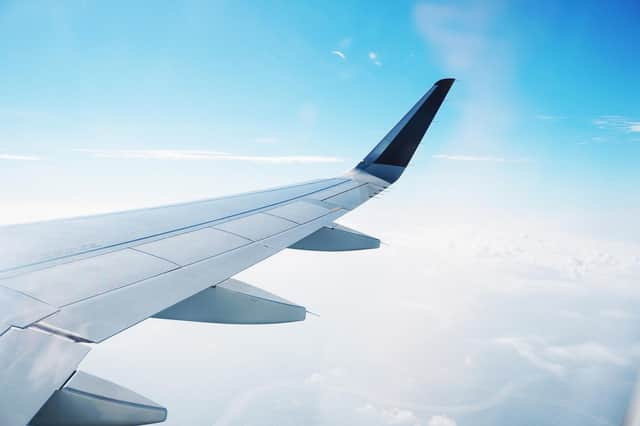Flying away for a holiday? Physiotherapist reveals top plane tips on how to prevent health risks during air travel


Air travel has become a vital part of our lives, whether it be going on holiday or visiting family across the country and abroad. However, the way we fly can have some negative effects on our physical health. According to GulfPhysio co-founder and physiotherapist Kieran Sheridan, there are over 224 million people travelling to and from the UK airports every year.
Of course it is exciting to travel to another destination and create new experiences, but long-distance air travel can take a toll on the body because of poor ergonomics, inability to move, cramped space, and dehydration. If left unaddressed, this can create different health issues including neck and shoulder aches, cramps, numbness, blood circulation problems, lower back pain, and worse or blood clots.
Advertisement
Hide AdAdvertisement
Hide AdBy being inactive in prolonged travel, people can also face deep vein thrombosis (DVT), which can be dissolved on its own but could be life-threatening. "Once that blood clot travels to the lungs and causes a blockage, it will result in a fatal condition called pulmonary embolism," said Kieran. However, not all hope is lost, you can minimise the side effects of travelling for long periods through these simple steps:
Move while on the plane
The main problem with plane rides is being immobile for so long so it is recommended to move around and do some stretching and exercising. One easy way is walking around the airport and this can be done in as little as 30 minutes. "You can explore the airport by shopping or ditching the walkalator by just walking with your luggage. This will help minimise stiffness and discomfort in the plane whilst you are inactive," Kieran said.
Another way is doing easy stretches whilst in a sitting position. The physiotherapist recommended pulling your knees up to your chest and holding them there with your hands hugging your lower leg for 15 seconds. He said: "Do this up to 10 times to enhance blood flow in your legs. This works wonders because blood circulation of your legs will be suffering too from immobility. To counter inactivity, you can also do the fists exercise, which can be done by making a fist with your hands and putting them close to the edge of the seat. After that, lift your bottom off the seat as well as your feet off of the floor. Other exercises include neck rotations and arm stretches, which will promote flexibility.
Post-flight exercises are just as essential because they can help re-mobilise the body after being inactive whilst sitting on an uncomfortable plane seat. "It will also help you pump up your blood flow, boost heart rate and core, and regain strength when travelling,” Sheridan said. “Some challenging but effective exercises you can try are squats and push-ups.” You can try a squat and oblique crunch by putting your hands to your head and rising by lifting one leg and crunching down to touch the same side elbow to your knee. Do this again on the other side. For push-ups, you can do a mountain climber, which can be performed by getting in a pushup position and then, holding a plank with your weight on your hands and toes. By keeping the spine straight, drive one knee up towards the chest and then back. Do this again with the opposite leg.
Advertisement
Hide AdAdvertisement
Hide AdWatch your posture
It's bad enough that you don't move around much whilst on a long plane ride. To avoid musculoskeletal issues and stiffness, he advises implementing proper posture. He said: "To observe correct posture, your feet should be on the floor and sit upright. You can try wearing a neck pillow to support your head and neck, preventing neck stiffness and lower back pain.”
Wear comfortable clothes
If you want a safe flight free of discomfort, steer clear of tight clothes and ill-fitting shoes. "By wearing comfortable clothes and the right types of shoes, you can avoid issues in blood circulation," Sheridan said. "Putting on tight clothes is also a no-no since the body swells during flights. For that reason, you can't move freely in an already cramped space and your blood circulation will suffer," he added. Some ideal clothing for long plane rides are loafers, lightweight slip-ons, and stretchy pants such as yoga pants or jogging bottoms.
Limit phones and laptop use
Overusing mobile phones or laptops can impact your back due to poor posture. Hunching your back whilst staring at your phone will not only make your body posture look bad but also cause spine problems like pinched nerves and herniated discs. The physio said: "Ditch the screen time by listening to music whilst following proper posture. Some aeroplanes also have seatback TV screens which will help you sit properly and stare at the screen without hunching back,"
Drink enough water
Since you are inhaling some recycled air on the plane, you tend to get dehydrated. The 50% of air circulating in the cabin stems from the outside, which is at high altitudes, resulting in air with low moisture. To stay healthy, Sheridan advised filling in a bottle with water after passing through security checks. "You should also avoid alcohol, caffeine and other liquids that can worsen the dehydration. Drinking enough water can help retain your overall body functionality as well as muscle strength," said Kieran.
Advertisement
Hide AdAdvertisement
Hide AdAll these tips apply particularly to the elderly who can even consult their GP before long-haul flights. Regardless of age however, all travellers must take particular care when flying so they can enjoy their time away uninterrupted. All tips to keep in mind as spring continues and summer is just around the corner.
Comment Guidelines
National World encourages reader discussion on our stories. User feedback, insights and back-and-forth exchanges add a rich layer of context to reporting. Please review our Community Guidelines before commenting.